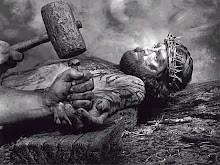In the Gospel of
Matthew we find Jesus teaching us some of the things He expects of His
disciples. Each and every Christian is a disciple for that is the Great Commission
Jesus gave in Matthew 28:18-20 saying,
"All authority has been given to Me in heaven and on earth.”Go therefore
and make disciples of all the nations, baptizing them in the name of the Father
and the Son and the Holy Spirit, teaching them to observe all that I commanded
you; and lo, I am with you always, even to the end of the age."
Jesus defines discipleship in Matthew 10:24-42. In this
reading we find 6 things that He expects of those who call Him Lord and choose to
follow Him. John MacArthur says this in his commentary on Matthew, 1.
“The true disciple of Jesus Christ emulates His Master; he fears God rather
than the world; he confesses the Lord; he forsakes family; he follows his call;
and he receives a reward.
Today let us look at the first element of discipleship which
is that a disciple emulates his master. The scripture reference here is Matthew 10:24-25:
"A disciple is not above his teacher, nor a slave above his master.
"It is enough for the disciple that he become like his teacher, and the slave like his master. If they have called the head of the house Beelzebul, how much more will they malign the members of his household!
"A disciple is not above his teacher, nor a slave above his master.
"It is enough for the disciple that he become like his teacher, and the slave like his master. If they have called the head of the house Beelzebul, how much more will they malign the members of his household!
Verse 24 seems simple enough and makes sense. Most of us
understand this because as children we attended school and until at least our
teenage years we probably respected the knowledge of our teachers and believed
they were above us in knowledge. Once we become employees somewhere, though we
are not slaves, the principle remains the same. Our employer and our immediate supervisor
exercise a certain amount of control over us. In our relationship with Jesus it
is necessary that we exhibit the most obvious principle of discipleship, that
of submission. Jesus does not mince words on this and there are many examples
in scripture of His calling us to obey His commands and that our salvation
assurance is based upon that being true. I point out just one and it is a
simple but clear directive on obedience. In John 14:15 Jesus says, "If you love Me, you will keep My
commandments.”
The second part of our call to emulate Christ comes in
Matthew 10:25 where Jesus says “It is enough for the student to be like his
teacher, and the servant like his master.” The reason we must learn from our
teacher is so that we become just like Him. This is a lifelong process and we
see that in Luke 6:40 “A student
is not above his teacher, but everyone who is fully trained will be like his
teacher.” We should be training to be like Jesus. Of course that does not ever
mean we will be equal with Jesus for He is God, but it means we can become just
like Him in terms of love. To become like our master as slaves is really
fascinating for no one has ever been a servant like Jesus who gave up
everything for us.
So to sum all this up we simply must be seeking to know
Christ so well that we become like Him and then when the world sees us they
will see Jesus. We must become avid students of Jesus and the best way to learn
from him is to read His Word. Colossians
3:16 is a beautiful description of how we can use this command to encourage
each other as we walk this journey.
“Let the word of Christ dwell in you richly as you teach and admonish one another with all wisdom, and as you sing psalms, hymns and spiritual songs with gratitude in your hearts to God.”
“Let the word of Christ dwell in you richly as you teach and admonish one another with all wisdom, and as you sing psalms, hymns and spiritual songs with gratitude in your hearts to God.”
So live today as a disciple. Even though we may fail often
as we dwell in the classroom of Christ, we can live in the assured hope of His
return when all things will be made right including us. I leave you with the
great words of 1 John 3:2, “Dear
friends, now we are children of God, and what we will be has not yet been made
known. But we know that when he appears, we shall be like him, for we shall see
him as he is.”
Next time we will look at the disciple and what it means to
fear God.
1. MacArthur
New Testament Commentary, The MacArthur New Testament Commentary – Matthew 8-15.

No comments:
Post a Comment